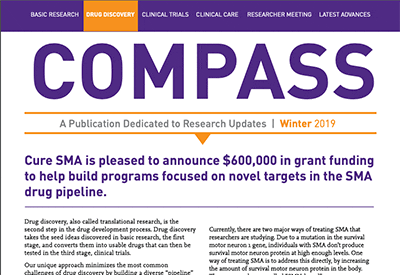Cure SMA has awarded a $150,000 research grant to Allison Ebert, PhD, at the Medical College of Wisconsin, for her project, “Role of astrocyte-produced miR-146a in SMA pathology.”
SMA is caused by mutations in the SMN1 gene resulting in low levels of SMN protein, which is expressed in every cell in the body. The goal of this project is to understand how low levels of SMN protein in other cells of the central nervous system, contribute to motor neuron loss in SMA.
Dr. Ebert and her team are more specifically concerned with astrocytes, star-shaped cells known to secrete factors which support motor neurons in the brain and spinal cord. They will examine how SMA astrocytes function to cause motor neuron dysfunction and death.
Understanding how astrocytes cause motor neurons to become sick and die in SMA will help further our understanding of SMA pathology and provide knowledge which can be used to optimize drug development.
Meet Dr. Ebert
Who are you?
I am a native of Indiana and have stayed in the Midwest for my entire scientific career. I received my PhD in neuroscience from Northwestern University in Chicago, did postdoctoral training in stem cell biology at the University of Wisconsin in Madison, and am currently an Assistant Professor at the Medical College of Wisconsin in Milwaukee. I use SMA mouse models, as well as human stem cells, to study how neurons and glial cells interact and become affected during the course of disease.
How did you first become involved with SMA research?
I became involved in SMA research in 2007 when we began to establish a human stem cell model for SMA. We were the first to generate and characterize SMA patient-derived stem cells as a model for understanding features of the disease.
What is your current role in SMA research?
My lab focuses on understanding molecular pathways that lead to motor neuron loss. Reduced SMN clearly causes motor neuron loss, but my lab aims to understand how losing SMN expression in other cell types, specifically glial cells, negatively impacts the whole neural system. Glial cells play a critical role in neuron health and function, so we are interested in learning more about how reduced SMN changes the glial cells from a supportive role to a toxic one.
What do you hope to learn from this research project?
Astrocytes are cells in the brain and spinal cord that normally nurture and support motor neurons to maintain optimal health and survival. We aim to determine how SMA astrocytes actually contribute to motor neuron loss in SMA.
How will this project work?
We will use three unique model systems to identify astrocyte involvement in SMA pathology: 1) cultured motor neurons generated from human SMA patient-derived stem cells, 2) a novel SMA mouse model in which a specific molecule is deleted from astrocytes, and 3) cerebral spinal fluid collected from SMA patients. These tissues and model systems will aid our understanding of the role that astrocytes play in SMA disease processes.
What is the significance of your study?
The proposed studies have the potential to significantly impact the understanding of astrocyte-mediated motor neuron loss and may identify a novel pathway for therapeutic intervention that could complement SMN-targeting therapies.
Basic Research Funding
This grant to Dr. Ebert is part of $1,325,000 in new basic research funding that we’re currently announcing.
Basic research is the first step in our comprehensive research model. We fund basic research to investigate the biology and cause of SMA, in order to identify the most effective strategies for drug discovery. We also use this funding to develop tools that facilitate SMA research.



